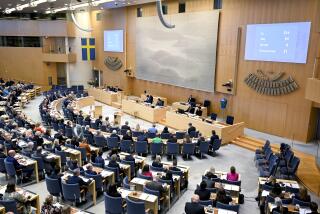German Ruling Upholds Gay Marriage
- Share via
BERLIN — Legal recognition of same-sex marriages presents no threat to heterosexual couples, Germany’s Constitutional Court ruled Wednesday in a blow to conservatives who have waged a campaign for traditional family values in this emotionally charged election season.
Conservatives in the three states that challenged the year-old gay marriage law conceded defeat but continued to loudly lament what they see as deterioration of official support for the nuclear family.
Bavarian Gov. Edmund Stoiber, who is challenging Chancellor Gerhard Schroeder for national leadership in the Sept. 22 election, called the high court ruling “regrettable.” But he said he and his rightist political allies would not seek to repeal the gay rights legislation if they win the election.
Meanwhile, liberal Berlin celebrated the legal milestone in this country where Nazis once persecuted homosexuals, who until 1969 were defined as criminals.
Mayor Klaus Wowereit, Germany’s most prominent openly gay politician, praised the decision as “a meaningful contribution to ending centuries of discrimination.”
Schroeder’s Social Democrats and their coalition partners, the Greens, also heralded the ruling as validation of the social policies defining the center-left government, which is facing a tough reelection battle.
Justice Minister Herta Daeubler-Gmelin said the court’s 5-3 decision to uphold the constitutionality of gay unions was proper and urged Stoiber and his conservative allies in the Christian Democratic Union to cease their parliamentary and legal blockade of other legislation meant to enhance gay rights.
The Constitutional Court challenge was brought by the states of Bavaria, Saxony and Thuringia, all governed by conservatives who contended that legal status for gay marriages violated the 1949 Basic Law’s protection of marriage and family.
In its ruling, the court said that “marriage is neither damaged or in any other way restricted” by the new law. Gay marriages are also recognized in Denmark, Sweden, France and the Netherlands.
“This is everything we have wished for,” Axel Blumenthal of the Lesbian and Gay Assn. of Germany said. He predicted that thousands more same-sex couples will join the 4,400 pairs married since the law took effect Aug. 1, 2001, now that their legal rights have been affirmed.
The law allows gays to wed at government registry offices, extends inheritance and insurance rights to both partners and requires a legal decree of divorce in the event of the relationship’s dissolution.
Legislation is pending in the Bundestag, the lower house of Parliament, that would accord the same tax privileges to gay marriages as to heterosexual couples.
All major political parties except the CDU and their Christian Social Union allies in Bavaria hailed the ruling as a positive step toward guaranteeing equal rights.
Stoiber this month named a 28-year-old unwed mother as his social policy advisor in a bid to improve his standing in the former Communist east and among women. But the choice of Brandenburg state legislator Katherina Reiche as his aide angered many traditionalists in his party. That may explain her about-face on gay rights: In an interview Wednesday in the conservative Die Welt daily, she deemed such unions unacceptable.
Roman Catholic Church leaders have long opposed the recognition of gay partnerships as legal marriages and refuse to sanctify the unions with church rituals.
The Catholic Bishops Conference in Germany lamented the upholding of gay marriage as constitutional. Cardinal Karl Lehmann warned that equating homosexual marriage with the sacramental state between a man and a woman constitutes “damage to society.”
More to Read
Sign up for Essential California
The most important California stories and recommendations in your inbox every morning.
You may occasionally receive promotional content from the Los Angeles Times.














